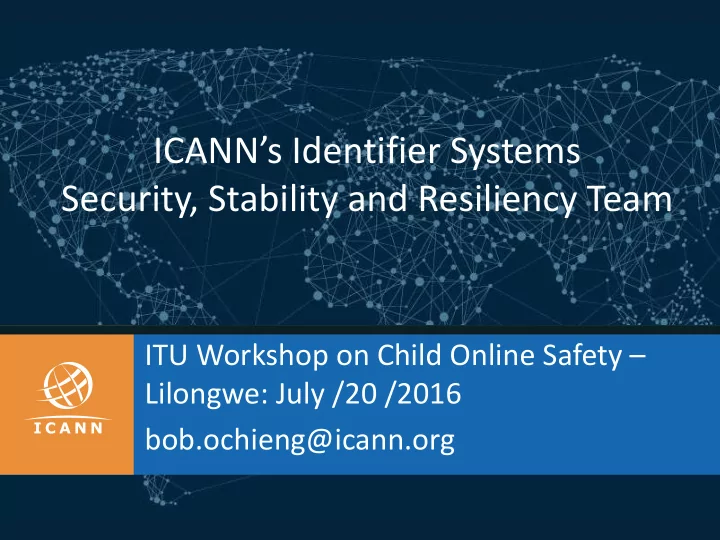

ICANN’s Identifier Systems Security, Stability and Resiliency Team ITU Workshop on Child Online Safety – Lilongwe: July /20 /2016 bob.ochieng@icann.org
What is ICANN? The Internet Corporation for Assigned Names and Numbers (ICANN) is a global multistakeholder, private sector-led organization that manages Internet resources for the public benefit ICANN coordinates the top-level of the Internet's system of unique identifiers via global, multistakeholder, bottom-up consensus policy processes, with the outcome of those processes implemented via the IANA Functions. | 2
ISSSR Team: Areas of Operation Threat Awareness Capability and Building Preparedness Trust- based Analytics Collaboration | 3
| 4
Threat Awareness ICANN’s ISSSR Team exchanges or acts on threat intelligence or incidents involving global Internet identifiers to mitigate threats • DNS Coordinated Vulnerability Disclosure • Tactical response to attacks • Collaborative incident response https://www.flickr.com/photos/opacity/ | 5
Capability Building The IS SSR Team • Provides technical training to ccTLD operators or public safety communities – Registry operations – DNSSEC – Investigating identifier systems abuse • Collaborates on cybersecurity matters with security communities – APWG, MAAWG, DNS OARC… • Shares cybersecurity subject matter expertise with legislation or policy makers or government agencies | 6
Analytics ICANN’s ISSSR Team studies identifier system abuse or performance using event or reputation data • Security threats e.g., spam, phishing, C2, malware… • Whois accuracy • DNS security, stability, resiliency | 7
Trust-based Collaboration ICANN’s ISSSR team engages with cybersecurity and public safety communities • To identify or mitigate identifier system abuse • Share information related to identifier system misuse Team also acts as a trusted introducer between DNS and information security communities https://www.flickr.com/photos/slagheap/ | 8
How Does Trust-based Collaboration Work? • Private- and public sector investigators cooperate Most harm occurs in first hours of attack 24x7 using trusted communications channels • Information sharing • Malware, phishing, spam samples • Host names, URLs, addresses, geo-location Technology is motive agnostic: criminals, • Activities of persons of interest (e.g., social media posts) investigators, admins use the same tools • Points of contact (targets, victims, operators, investigators) • Coordination or hand off • Motive distinguishes the nature and Mitigating DDoS by squelching sources 3 • Providing evidence of AUP violation to operator for action objectives of attacks | 9
Trust is Earned • New participants earn nominations from existing Most harm occurs in first hours of attack members and are vetted prior to admission • Personal references, • Prior collaboration and Technology is motive agnostic: criminals, • Reputation investigators, admins use the same tools • Individuals put own reputation and membership at risk when they nominate • Strict codes of conduct Motive distinguishes the nature and 3 • objectives of attacks Self-policing model | 10
Is trust-based collaboration effective? Yes. It reduces the attack surface in several ways: Most harm occurs in first hours of attack • Sharing “data feeds” forms the bases for action • Sharing malware samples expedites remediation • Sharing intelligence improves dossiers on suspected Technology is motive agnostic: criminals, criminal actors investigators, admins use the same tools • Reduces time from threat identification to containment or mitigation Motive distinguishes the nature and • Gives participating law enforcement agents insights 3 objectives of attacks other than direct complaints | 11
Thank you | 12
Recommend
More recommend